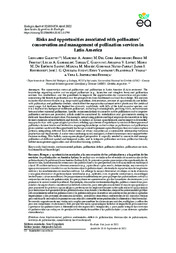Risks and opportunities associated with pollinators' conservation and management of pollination services in Latin America.
Risks and opportunities associated with pollinators' conservation and management of pollination services in Latin America.
Autoria: GALETTO, L.; AIZEN, M. A.; ARIZMENDI, M. del C.; FREITAS, B. M.; GARIBALDI, L. A.; GIANNINI, T. C.; LOPES, A. V.; ESPÍEIRTO SANTO, M. M. do; MAUES, M. M.; NATES-PARRA, G.; RODRIGUEZ, J. I.; QUEZADA-EUAN, J. J. G.; VANDAME, R.; VIANA, B. F.; IMPERATRIZ-FONSECA, V. L.
Resumo: The conservation status of pollinators and pollination in Latin America (LA) is reviewed. The knowledge regarding native and managed pollinators (e.g., honeybee and stingless bees) and pollination services was synthetized, and the guidelines to improve the opportunities for conservation are provided, considering the threats to pollinators and the perspectives from traditional and local knowledge. The analysis indicates that diverse threats (e.g., large-scale agriculture, deforestation, overuse of agrochemicals) are linked with pollination and pollinator decline, which affect the reproduction of most native plants and the yields of many crops. LA harbours the highest bee diversity worldwide, with 26% of the total recorded species, and it is a biodiversity hotspot of vertebrate pollinators, including hummingbirds, perching birds, nectarivorous bats and other mammal pollinators. Specific recommendations to conserve native pollinators and to improve pollination services are provided, which could be considered by stakeholders and governments aiming to elaborate biocultural conservation. For example, introducing policies and legal responses for incentives to help farmers maintain natural habitats and forests, to replace or reduce agrochemicals and to improve diversified crop production with agroecological practices; refining agrochemical regulations to minimize the exposure of pollinators to insecticides and herbicides; improving knowledge and education on pollinators and pollination gives societies worldwide the opportunity to change current hegemonic agricultural practices and consumption patterns; integrating different land ethical views of ethnic minorities on a sustainable relationship between production and biodiversity. A wider view combining social, ecological, cultural dimensions may support better decision making. This holistic socio-agroecological perspective is urgently needed to conserve and manage pollinators at different spatial and temporal scales, and to integrate pollination services, pollinator-friendly habitat management approaches and diversified farming systems.
Ano de publicação: 2022
Tipo de publicação: Artigo de periódico
Unidade: Embrapa Amazônia Oriental
Observações
1 - Por padrão são exibidas publicações dos últimos 20 anos. Para encontrar publicações mais antigas, configure o filtro ano de publicação, colocando o ano a partir do qual você deseja encontrar publicações. O filtro está na coluna da esquerda na busca acima.
2 - Para ler algumas publicações da Embrapa (apenas as que estão em formato ePub), é necessário ter, no celular ou computador, um desses softwares gratuitos. Sistemas Android: Google Play Livros; IOS: iBooks; Windows e Linux: software Calibre.
Acesse outras publicações
Acesse a Base de Dados da Pesquisa Agropecuária (BDPA) para consultar o acervo completo das bibliotecas da Embrapa.

